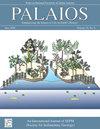LARGE WOODY DEBRIS ACCUMULATIONS IN THE LATE PENNSYLVANIAN TROPICS—EVOLUTIONARY SIGNAL OR TECTONO-CLIMATIC ARCHIVE?
IF 1.5
4区 地球科学
Q2 GEOLOGY
引用次数: 5
Abstract
Abstract: By colonizing drylands, plants fundamentally changed continental deposition and, thus, intensified the interaction between life and sediments. Fossil large woody debris in epiclastic strata is a key archive of this environmental turnover, although its interpretation remains challenging due to taphonomic biases. We review voluminous fluvial red-bed successions with sizeable silicified trunks that characterize Middle Pennsylvanian–lower Permian strata of east-central Europe. The stratigraphic occurrence, petrography, architecture of the deposits, and the preservation and nature of the fossil wood are discussed in the context of the tectono-climatic and vegetational evolution of the central-Pangean low latitudes. The log-bearing successions are assigned to five distinct, regionally traceable stratigraphic levels between the middle Moscovian and early Asselian. Up to 20 m long, mostly decorticated trunk fragments occur isolated in more or less feldspathic channel deposits, the architectures and dimensions of which point to large-scale river systems with highly variable discharge. Wood anatomy and floodplain adpression-fossils show that the trunks were derived from cordaitaleans, conifers, and arborescent sphenopsids in more diverse, gymnosperm-dominated dryland floras. The fossil record is biased towards successions formed in large-catchment river systems and, thus, does not accurately document the genuine nature of plant-distribution patterns. Rather, the strata show that large woody debris preservation depended on fluvial style and hydrological regime, hence turning the woody deposits into climate archives. The strata elucidate the climate development in equatorial Pangea, paralleling the acme of the Late Paleozoic Ice Age.宾夕法尼亚晚期热带地区的大量木质碎屑堆积——演化信号还是构造-气候档案?
摘要:植物通过在旱地的殖民,从根本上改变了大陆沉积,从而加强了生命与沉积物之间的相互作用。碎屑地层中的大型木质碎屑化石是这种环境转换的关键档案,尽管由于地貌学的偏见,其解释仍然具有挑战性。我们回顾了具有相当大的硅化干的大量河流红层序列,它们是中欧东部中宾夕法尼亚-下二叠世地层的特征。结合中-泛古大陆低纬度地区的构造-气候和植被演化,讨论了沉积物的地层产状、岩石学、结构、化石木材的保存和性质。在莫斯科中期和亚塞利亚早期之间,测井序列被划分为五个不同的、区域可追溯的地层水平。长可达20米,大部分是脱屑的干流碎片孤立地出现在或多或少为长石质的河道沉积物中,其结构和尺寸表明具有高度可变流量的大型河流系统。木材解剖和洪泛区压迫化石表明,这些树干来自于更多样化的裸子植物主导的旱地植物区系中的珊瑚科植物、针叶树和乔木蕨。化石记录偏向于大流域河流系统形成的演替,因此不能准确地记录植物分布模式的真实本质。相反,地层表明,大型木质碎屑的保存取决于河流类型和水文制度,因此将木质沉积物转变为气候档案。这些地层说明了赤道盘古大陆的气候发展,与晚古生代冰河期的顶峰相当。
本文章由计算机程序翻译,如有差异,请以英文原文为准。
求助全文
约1分钟内获得全文
求助全文
来源期刊

Palaios
地学-地质学
CiteScore
2.80
自引率
12.50%
发文量
40
审稿时长
6 months
期刊介绍:
PALAIOS is a monthly journal, founded in 1986, dedicated to emphasizing the impact of life on Earth''s history as recorded in the paleontological and sedimentological records. PALAIOS disseminates information to an international spectrum of geologists and biologists interested in a broad range of topics, including, but not limited to, biogeochemistry, ichnology, paleoclimatology, paleoecology, paleoceanography, sedimentology, stratigraphy, geomicrobiology, paleobiogeochemistry, and astrobiology.
PALAIOS publishes original papers that emphasize using paleontology to answer important geological and biological questions that further our understanding of Earth history. Accordingly, manuscripts whose subject matter and conclusions have broader geologic implications are much more likely to be selected for publication. Given that the purpose of PALAIOS is to generate enthusiasm for paleontology among a broad spectrum of readers, the editors request the following: titles that generate immediate interest; abstracts that emphasize important conclusions; illustrations of professional caliber used in place of words; and lively, yet scholarly, text.
 求助内容:
求助内容: 应助结果提醒方式:
应助结果提醒方式:


